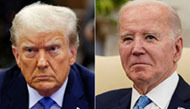▶ THOMAS L. FRIEDMAN
Ever since the onset of the Arab awakening, the U.S. has been looking for ways to connect with the Arab youths who spearheaded the revolutions; 60 percent of the Arab world is under age 25. If it were up to me, I’d put Arne Duncan, the secretary of education, in charge of American policy in the Arab-Muslim world. Because we need to phase out of the cold war business of selling arms there to keep “strongmen” on our side and in power, and we need to get into the business of sponsoring a “Race to the Top” in the Arab-Muslim world that, instead, can help empower institutions and strong people, who would voluntarily want to be on our side.
Look at the real trends in the region. In Iraq and Afghanistan, sadly, autocracy has not been replaced with democracy, but with “elective kleptocracy.” Elective kleptocracy is what you get when you replace an autocracy with an elected government before there are accountable institutions and transparency, while huge piles of money beckon — in Iraq thanks to oil exports, and in Afghanistan thanks to foreign aid.
Meanwhile, in Tunisia, Yemen, Egypt, Iraq and Libya, we have also seen the collapse of the “Mukhabarat states” — Mukhabarat is Arabic for internal security services — but not yet the rise of effective democracies, with their own security organs governed by the rule of law. As we saw in Libya, this gap is creating openings for jihadists. As the former C.I.A. analyst Bruce Riedel put it in a recent essay in The Daily Beast, “The old police states, called mukhabarat states in Arabic, were authoritarian dictatorships that ruled their people arbitrarily and poorly. But they were good at fighting terror. ... These new governments are trying to do something the Arab world has never done before — create structures where the rule of law applies and the secret police are held accountable to elected officials. That is a tall order, especially when terrorists are trying to create chaos.”
At the same time, the civil war between Sunni Muslims, led by the Saudis, and Shiite Muslims, led by Iran, is blazing as hot as ever and lies at the heart of the civil war in Syria. In addition, we also have a struggle within Sunni Islam between puritanical Salafists and more traditional Muslim Brotherhood activists. And then there is the struggle between all of these Islamist parties — who argue that “Islam is the answer” for development — and the more secular mainstream forces, who may constitute the majority in most Mideast societies but are disorganized and divided.
How does the U.S. impact a region with so many cross-cutting conflicts and agendas? We start by making clear that the new Arab governments are free to choose any path they desire, but we will only support those who agree that the countries that thrive today: 1) educate their people up to the most modern standards; 2) empower their women; 3) embrace religious pluralism; 4) have multiple parties, regular elections and a free press; 5) maintain their treaty commitments; and 6) control their violent extremists with security forces governed by the rule of law. That’s what we think is “the answer,” and our race to the top will fund schools and programs that advance those principles. (To their credit, Romney wants to move in this direction and Obama’s Agency for International Development is already doing so.)
But when we’re talking to the Muslim Brotherhood in Egypt or the new government in Libya, we cannot let them come to us and say: “We need money, but right now our politics is not right for us to do certain things. Give us a pass.” We bought that line for 50 years from their dictators. It didn’t end well. We need to stick to our principles.
This is going to be a long struggle on many fronts. And it requires a big shift in thinking in the Arab-Muslim world, argues Husain Haqqani, the former Pakistani ambassador to the U.S., from “us versus them to us versus our own problems.” And from “we are weak and poor because we were colonized” to “we were colonized because we were weak and poor.” Voices can be heard now making those points, says Haqqani, and I think we best encourage them by being very clear about what we stand for. The Middle East only puts a smile on your face when change starts with them, not us. Only then is it self-sustaining, and only then can our help truly amplify it.
스마터리빙
more [ 건강]
[ 건강]이제 혈관 건강도 챙기자!
[현대해운]우리 눈에 보이지 않기 때문에 혈관 건강을 챙기는 것은 결코 쉽지 않은데요. 여러분은 혈관 건강을 유지하기 위해 어떤 노력을 하시나요?
 [ 건강]
[ 건강]내 몸이 건강해지는 과일궁합
 [ 라이프]
[ 라이프]벌레야 물럿거라! 천연 해충제 만들기
 [ 건강]
[ 건강]혈압 낮추는데 좋은 식품
[현대해운]혈관 건강은 주로 노화가 진행되면서 지켜야 할 문제라고 인식되어 왔습니다. 최근 생활 패턴과 식생활의 변화로 혈관의 노화 진행이 빨라지고
사람·사람들
more많이 본 기사
- ‘박성광♥’ 이솔이, 암 투병 중 안타까운 소식 “병원 몇 번 가는 건지..내 탓”
- 지구촌 또 ‘총기 난사’… 미·호주 잇단 참사
- ‘128개 홈디포 매장서 319건 절도’ 플러싱 기반 전문절도단 일망타진
- “내 한국인 남편, 40일 넘게 개처럼 갇혀있다”
- 비극 속 시민의 용기 총격범 맨손 제압
- 트럼프와 여성들 함께 찍힌 ‘엡스타인 사진’ 공개
- ‘해리가 샐리를 만났을 때’ 롭 라이너 감독 부부 피살
- 전재수, 통일교 행사 참석 의혹에 “고향서 벌초했다” 반박
- 백화점서 아기 기저귀 갈던 엄마 40대 정신질환자에 흉기 피습
- 시드니 유대인 총기참사 용의자는 50세 아버지·24세 아들
- 경찰, 쿠팡 6차 압수수색 11시간30분만에 종료 “데이터 방대”
- ‘마리화나 규제 대폭 완화’ 트럼프, 행정명령 검토
- 野 “30년前 폭행 검증해야”…정원오 “사건 직후 사과하고 화해”
- 건축회사 누보하우스
- 180일 수사 마치고 재판 넘긴 내란특검…이제 ‘법원의 시간’
- ‘내포 신도시 뉴욕설명회’성황
- [경제 트렌드] 외식비 줄이는 소비자… ‘팁 공포’ 한몫
- 경동중고 동창회 워싱턴지부
- 인니 수마트라섬 ‘대홍수’
- ROTC 워싱턴DC 문무회
- 고려대 워싱턴교우회
- 19개주, 전문직 비자 ‘10만불 수수료’ 소송
- 서폭카운티 우정국 직원 우편물 절도 혐의 체포
- 피로 얼룩진 주말…지구촌 곳곳 총격사건 잇달아
- 역시 호날두! 북중미 WC 인기 티켓 1위는? 포르투갈-콜롬비아전... 3위가 한국-멕시코전 “개최국 효과”
- ‘지독한 플래툰’ 김혜성도 71G 뛰었는데, 美 팬그래프 ‘송성문 ML 36G 타율 0.251’ 예상
- ‘민권센터와 함께 따뜻한 겨울나기’
- 버지니아, 도로 상태‘전국 2위’…MD 13위·1위 GA
- 국과수 “김수현·故 김새론 녹취파일, AI 조작 판정 불가”
- 봄학기 무료 영어·컴퓨터 수업 수강생 모집
- 통계로 본 올해 대한항공… ‘캡틴 아메리카’ 가장 많이 보고, 최다 방문지 도쿄
- 오늘 추첨 파워볼 잭팟 11억달러로 ‘껑충’
- 항공기 승객정보 활용 추방 확대
- 안수화 회장 연임 확정
- 뉴욕·뉴저지 등 19개 주정부 H-1B비자‘10만달러 수수료’소송
- 박나래 ‘링거이모’, 진짜 ‘無면허’였다 “박나래 알지만 전혀 기억 안 나”
- “성과는 있었지만 아직 끝 아냐”
- 호주 총격범 제압 시민 영웅은 43세 과일가게 주인 아흐메드 씨
- 원지, ‘6평 사무실’ 논란 후 첫 방송 출연..無편집 “적응 안 돼”
- 워싱턴 지역 올 겨울 두 번째 눈
- 박나래 ‘링거·주사 이모’ 난리통 속 결국..MBC ‘팜유트립’ 제작 무산
- 미, 베네수엘라 지상전 위협… 쿠바까지 흔들기
- ‘15년째 활동 無’ 원빈 근황, 이시언 유튜브서 공개..”잘 지내는 중”
- “트럼프, 바이든 데자뷔인줄” 취임 1년새 고령 논란·지지율 뚝
- 뉴욕 백화점서 아기 기저귀 갈던 엄마, 정신질환자에 흉기피습
- 팝핀현준, 수업 중 발언 논란에 교수직 사임… “진심으로 사과”
- 워싱턴 한국학교협의회, 제37회 교사의 밤
- ‘아연’의 효과… 올바르게 복용하면 감기 기간 줄일 수도
- 연말 DUI 집중 단속 무관용 강력 처벌
- 오늘의 베네수엘라가 내일의 동아시아국… 2
1/5지식톡

-
 테슬라 자동차 시트커버 장착
0
테슬라 자동차 시트커버 장착
0테슬라 시트커버, 사놓고 아직 못 씌우셨죠?장착이 생각보다 쉽지 않습니다.20년 경력 전문가에게 맡기세요 — 깔끔하고 딱 맞게 장착해드립니다!장착비용:앞좌석: $40뒷좌석: $60앞·뒷좌석 …
-
 식당용 부탄가스
0
식당용 부탄가스
0식당용 부탄가스 홀세일 합니다 로스앤젤레스 다운타운 픽업 가능 안녕 하세요?강아지 & 고양이 모든 애완동물 / 반려동물 식품 & 모든 애완동물/반려동물 관련 제품들 전문적으로 홀세일/취급하는 회사 입니다 100% …
-
 ACSL 국제 컴퓨터 과학 대회, …
0
ACSL 국제 컴퓨터 과학 대회, …
0웹사이트 : www.eduspot.co.kr 카카오톡 상담하기 : https://pf.kakao.com/_BEQWxb블로그 : https://blog.naver.com/eduspotmain안녕하세요, 에듀스팟입니다…
-
 바디프렌드 안마의자 창고 리퍼브 세…
0
바디프렌드 안마의자 창고 리퍼브 세…
0거의 새제품급 리퍼브 안마의자 대방출 한다고 합니다!8월 23일(토)…24일(일) 단 이틀!특가 판매가Famille: $500 ~ $1,000Falcon: $1,500 ~ $2,500픽업 & 배송직접 픽업 가능LA…
-
 바디프렌드 안마의자 창고 리퍼브 세…
0
바디프렌드 안마의자 창고 리퍼브 세…
0거의 새제품급 리퍼브 안마의자 대방출 한다고 합니다!8월 23일(토)…24일(일) 단 이틀!특가 판매가Famille: $500 ~ $1,000Falcon: $1,500 ~ $2,500픽업 & 배송직접 픽업 가능LA…
케이타운 1번가
오피니언
 옥세철 논설위원
옥세철 논설위원오늘의 베네수엘라가 내일의 동아시아국가…

퇴조의 핑크 타이드
 조지 F·윌 워싱턴포스트 칼럼니스트
조지 F·윌 워싱턴포스트 칼럼니스트 [조지 F. 윌 칼럼] 대통령의 전쟁수행권
 조옥규 수필가
조옥규 수필가 투고(To Go) 해야 하나?
 신경립 / 서울경제
신경립 / 서울경제 [만화경] ‘뒷마당’ 찾겠다는 트럼프식 먼로주의

22기 LA평통 출범에 거는 기대

연말 시즌 사기·범죄 경계해야
 메건 매카들 워싱턴포스트 칼럼니스트
메건 매카들 워싱턴포스트 칼럼니스트 [메건 매카들 칼럼] 장편영화의 마지막 챕터인가
 김미선 서북미문인협회 회장시인
김미선 서북미문인협회 회장시인 [한국춘추] 하늘을 계산한 사람들, 칠정산
1/3지사별 뉴스

피로 얼룩진 주말…지구촌 곳곳 총격사건 잇달아
지난 주말 동안 미동부 아이비리그 브라운대학에서 총격 사건이 발생, 최소 2명이 사망하고 9명이 부상한데 이어 호주 시드니에서는 사망자 16…
뉴욕·뉴저지 등 19개 주정부 H-1B비자‘10만달러 수수료’소송

워싱턴 한국학교협의회, 제37회 교사의 밤
재미한국학교 워싱턴지역협의회(회장 정광미)가 13일 ‘제 37회 교사의 밤’을 개최, 한 해 동안 헌신한 교사들의 노고를 위로했다. 올해 최우…
안수화 회장 연임 확정

총격 상처 피해 진학한 대학서 또 총기난사… “엄청난 타격”
고교 총격 사건 생존자인 미아 트레타가 브라운대 총격 사건 이후 인터뷰하는 모습. [로이터]동부 브라운대에서 총격 사건으로 10여명의 사상자가…
내년 중간선거 낙관못하는 트럼프… “경제성과 전달에 시간 걸려”

오늘 하루 이 창 열지 않음 닫기 





















































.png)


댓글 안에 당신의 성숙함도 담아 주세요.
'오늘의 한마디'는 기사에 대하여 자신의 생각을 말하고 남의 생각을 들으며 서로 다양한 의견을 나누는 공간입니다. 그러나 간혹 불건전한 내용을 올리시는 분들이 계셔서 건전한 인터넷문화 정착을 위해 아래와 같은 운영원칙을 적용합니다.
자체 모니터링을 통해 아래에 해당하는 내용이 포함된 댓글이 발견되면 예고없이 삭제 조치를 하겠습니다.
불건전한 댓글을 올리거나, 이름에 비속어 및 상대방의 불쾌감을 주는 단어를 사용, 유명인 또는 특정 일반인을 사칭하는 경우 이용에 대한 차단 제재를 받을 수 있습니다. 차단될 경우, 일주일간 댓글을 달수 없게 됩니다.
명예훼손, 개인정보 유출, 욕설 등 법률에 위반되는 댓글은 관계 법령에 의거 민형사상 처벌을 받을 수 있으니 이용에 주의를 부탁드립니다.
Close
x